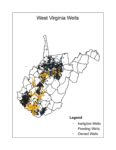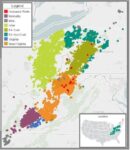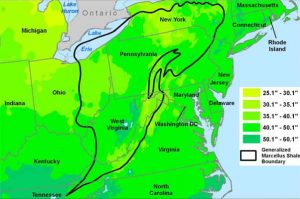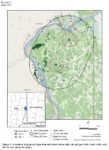Update: 5/14/2020: Oil and Gas Rule Passes on Last Day
(From the WV Environmental Council’s GREEN Legislative Update, 3/29/2010)
After what can only be described as a rough start, DEP’s Oil and Gas Well Drilling Rule was passed by both chambers on the last day of the session. It took some butting of heads and a couple of conference committees [see Thanks (and No Thanks) in our Spring 2010 newsletter for more details], but the rule as finally adopted begins to address drilling for Marcellus Shale natural gas in some positive ways.
The rule provides construction standards for large volume pits and impoundments. Amendments adopted make it highly unlikely that drillers will not use impermeable synthetic pit liners. And amendments were accepted that require notice and opportunity for a hearing for the surface owner, should a driller opt to use just a clay liner. [Click here to read the final language that was adopted.]
While we would have liked to see other protective measures included in the rule, this is a good first step at protecting the state’s water resources from Marcellus Shale drilling operations.
[To read the full version of the final rule approved by the legislature click here.]
Update: (2/9/10): For the latest on the Oil & Gas Rules see the following news stories
Minard works to weaken WVDEP’s new drilling rules (2-8)
‘Hallway deal’ resulted in more lax oil-gas regulations (with audio) (2-8)
Update: (1/13/10): DEP puts out Marcellus guidance document and permit addendum
Click here to view the Guidance Document.
Update: DEP approved the rule and submitted it to the legislature on July 30, 2009. You can read the agency approved rule, along with the comments submitted on the proposed rule and DEP’s response to those comments here (pdf missing). Although DEP incorporated a few of our recommendations, the concerns highlighted below remain unaddressed. The Legislative Rule-Making Review Committee is expected to take up the rule in December or January and we will push for it to be strengthened to our address our concerns. To date, DEP has yet to finalize its proposed Marcellus guidance document.
The West Virginia Department of Environmental Protection (DEP) is proposing significant changes to 35-CSR-4, the agency rule that regulates “Oil and Gas Wells and Other Wells.” These proposed rule changes will be sent to the Legislature for its consideration in 2010.
The West Virginia Surface Owners’ Rights Organization (WV SORO) joined with other statewide groups concerned about oil and gas issues (the West Virginia Rivers Coalition, the West Virginia Sierra Club, the West Virginia Highlands Conservancy, the West Virginia Citizen Action Group, the West Virginia Environmental Council and the Appalachian Center on the Economy and the Environment) to submit comments on this rule.
It has been more than 25 years since any significant changes were made to West Virginia’s drilling rules. The state’s regulation of oil and gas well drilling already has many problems, and new exploration using new processes, such as horizontal drilling and large volume fracturing, is creating new kinds of problems that need to be addressed, as well as the need for additional resources to address them. While the proposed agency rule makes some changes in response to the drilling of new Marcellus Shale formation wells, however, additional changes should be made, and existing rules need to be improved. WV SORO shares the environmental community’s concerns with regard to protecting the environment and in particular our water resources. WV SORO and others applaud the changes proposed by DEP, however we are concerned that they don’t go far enough in terms of protecting public health and the environment. (Keep reading or view our press release on the rule change for more details…)
Major issues not addressed in the rule include:
Where will the additional quantities of water required for these new drilling techniques come from?
What ends up in the water when it is used in hydraulic fracturing?
Where do drillers dispose of that water?
DEP made a meager attempt to respond to concerns about water withdrawals and waste water disposal with a “guidance” document that will not have the force of law. As WV SORO and others noted in our comments on the draft document, this level of response from DEP is inadequate, and neither the proposed rule changes or the guidance includes a requirement for public disclosure of the chemicals placed in the water used to fracture a well.
WV SORO Comments on DEP Marcellus Guidance Document
Comments filed by WV Sierra Club, WV Rivers Coalition and others on Marcellus Guidance Document
Summary of our comments on and recommended changes to the rule:
- We support the proposed rule change requiring all pits and impoundments to have a synthetic liner to prevent seepage or leakage. DEP should be applauded for making this long-overdue change.
- We recommend that reclamation of all pits and impoundments should include removal of all solid wastes, including the liners, to authorized off-site waste disposal facilities.
- We recommend that DEP develop siting requirements and restrictions for pits to prevent contamination of freshwater and to protect human health and the environment.
- We support the addition of section 35-4-21 “Construction of Pits and Impoundments with Capacity of Greater Than Five Thousand (5,000) Barrels.” This new section will help protect freshwater water resources throughout the drilling process, and will provide for more responsible reclamation.
- We support the requirement that a registered professional engineer design and certify the plans for and inspect all pits and impoundments before use.
- We support the requirement that all pits and impoundments be inspected every three days for the life of the structure.
- We recommend that drillers at the well site be required to have an emergency plan that includes a list of landowners down gradient and emergency service personnel to contact in the event of any pit or impoundment failure.
- We recommend that any potential hazard discovered during an inspection be reported immediately to DEP and appropriate emergency agencies.
- We recommend that DEP require disclosure of the chemicals used in hydraulic fracturing.
- We recommend the rule require testing and disclosure of the flow-back water contents, in addition to monitoring and reporting the flow-back volumes.
- We recommend that the flow-back water from all large volume frac jobs (greater than five thousand (5,000) barrels) be captured and transported off-site to authorized disposal or treatment facilities.
- We recommend testing water supplies for additional parameters to provide both landowners and operators greater confidence in whether or not the quality of a landowner’s water well changed during or after drilling.
- We recommend specific changes to make sure surface owners understand and are aware of a driller’s proposed activity. These include notifying them prior to the construction of all pits and impoundments and consulting them prior to approving changes to the driller’s reclamation plan.










